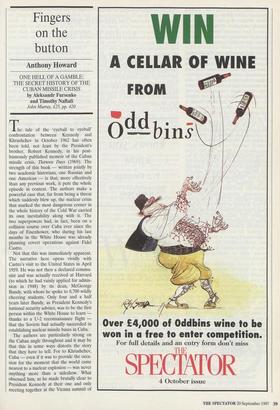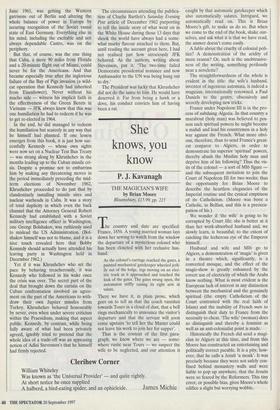Fingers on the button
Anthony Howard
ONE HELL OF A GAMBLE: THE SECRET HISTORY OF THE CUBAN MISSILE CRISIS by Aleksandr Fursenko and Timothy Naftali John Murray, £25, pp. 420 The tale of the 'eyeball to eyeball' confrontation between Kennedy and Khrushchev in October 1962 has often been told, not least by the President's brother, Robert Kennedy, in his post- humously published memoir of the Cuban missile crisis, Thirteen Days (1969). The strength of this book — written jointly by two academic historians, one Russian and one American — is that, more effectively than any previous work, it puts the whole episode in context. The authors make a powerful case that, far from being a threat which suddenly blew up, the nuclear crisis that marked the most dangerous corner in the whole history of the Cold War carried its own inevitability along with it. The two superpowers had, in fact, been on a collision course over Cuba ever since the days of Eisenhower, who during his last months in the White House was already planning covert operations against Fidel Castro.
Not that this was immediately apparent. The narrative here opens vividly with Castro's visit to the United States in April 1959. He was not then a declared commu- nist and was actually received at Harvard (to which he had vainly applied for admis- sion in 1948) by its dean, McGeorge Bundy, with whom he spoke to 8,700 wildly cheering students. Only four and a half years later Bundy, as President Kennedy's national security adviser, was to be the first person within the White House to learn thanks to a U-2 reconnaissance flight that the Soviets had actually succeeded in establishing nuclear missile bases in Cuba.
The authors are particularly strong on the Cuban angle throughout and it may be that this in some ways distorts the story that they have to tell. For to Khrushchev, Cuba — even if it was to provide the occa- sion for the moment that the world came nearest to a nuclear explosion — was never anything more than a sideshow. What obsessed him, as he made brutally clear to President Kennedy at their one and only meeting together at the Vienna summit of June 1961, was getting the Western garrisons out of Berlin and altering the whole balance of power in Europe by securing recognition of the Soviet vassal state of East Germany. Everything else in his mind, including the excitable and not always dependable Castro, was on the periphery.
But that, of course, was the one thing that Cuba, a mere 90 miles from Florida and a 20-minute flight out of Miami, could never be for the Americans. And that became especially true after the inglorious failure of the Bay of Pigs invasion (a wild- cat operation that Kennedy had inherited from Eisenhower). Never without his macho side — witness his implicit faith in the effectiveness of the Green Berets in Vietnam — JFK always knew that this was one humiliation he had to redeem if he was to get re-elected in 1964.
In the end, he did managed to redeem the humiliation but scarcely in any way that he himself had planned. If one lesson emerges from this book, it is just how suc- cessfully Kennedy — whose own sights were now set on a Nuclear Test Ban Treaty — was strung along by Khrushchev in the months leading up to the Cuban missile cri- sis. Despite a promise not to embarrass him by making any threatening moves in the period immediately preceding the mid- term elections of November 1962, Khrushchev proceeded to do just that by clandestinely installing missile sites and nuclear warheads in Cuba. It was a story of total duplicity in which even the back channel that the Attorney General Robert Kennedy had established with a Soviet military intelligence officer in Washington, one Georgi Bolshakov, was ruthlessly used to mislead the US Administration. (Bol- shakov himself was not to blame, and it is a nice touch revealed here that Bobby Kennedy should actually have attended his leaving party in Washington held in December 1962.) Yet if it was Khrushchev who set the pace by behaving treacherously, it was Kennedy who followed in his wake once the crisis was over. The secret part of the deal that brought down the curtain on the Cuban confrontation involved an agree- ment on the part of the Americans to with- draw their own Jupiter missiles from Turkey. Khrushchev behaved honourably by never, even when under severe criticism within the Praesidium, making that aspect public. Kennedy, by contrast, while being fully aware of what had been privately agreed, ignobly tried to pretend that the whole idea of a trade-off was an appeasing notion of Adlai Stevenson's that he himself had firmly rejected. The circumstances attending the publica- tion of Charlie Bartlett's Saturday Evening Post article of December 1962 purporting to tell the inside story of what went on in the White House during those 13 days that shook the world have always had a some- what murky flavour attached to them. But, until reading the account given here, I had not realised just how atrociously JFK behaved. As the authors, writing about Stevenson, put it: 'The two-time failed Democratic presidential nominee and now Ambassador to the UN was being hung out to dry.'
The President was lucky that Khrushchev did not do the same to him. He would have deserved it. Far from being a hawk or a dove, his conduct convicts him of having been a rat.



































































 Previous page
Previous page